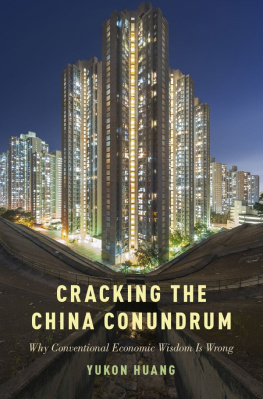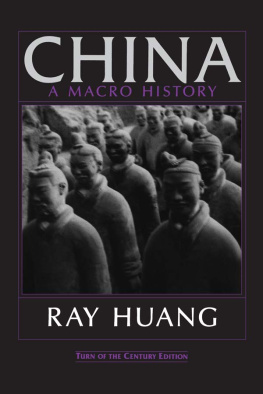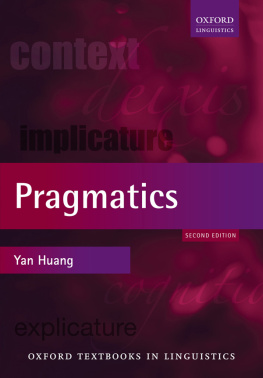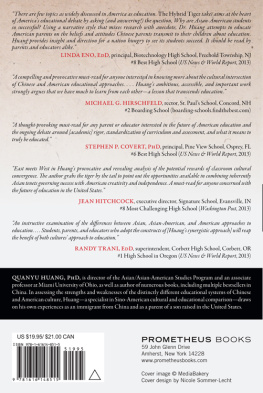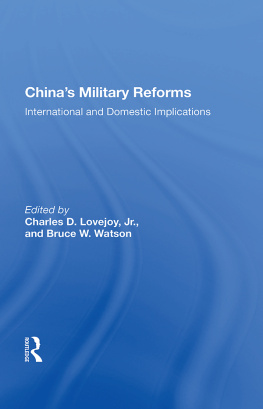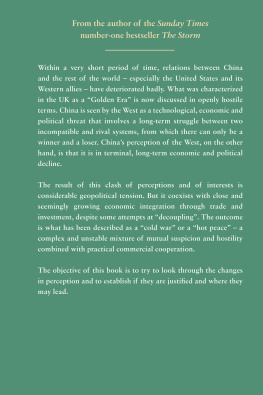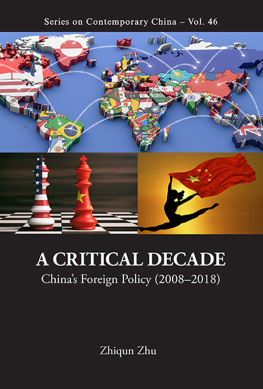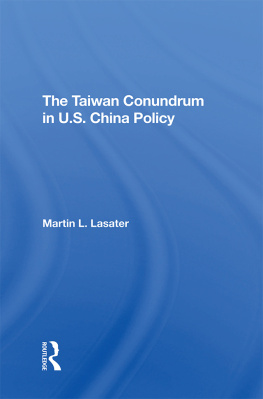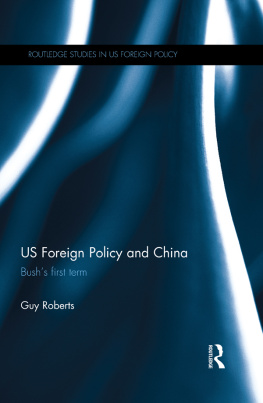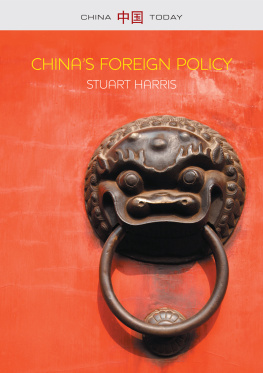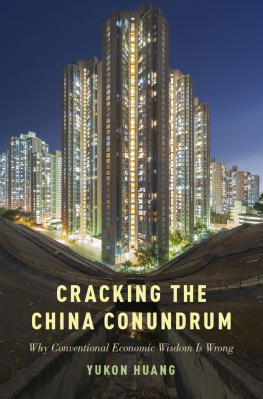Huang - Cracking the China Conundrum: Why Conventional Economic Wisdom Is Wrong
Here you can read online Huang - Cracking the China Conundrum: Why Conventional Economic Wisdom Is Wrong full text of the book (entire story) in english for free. Download pdf and epub, get meaning, cover and reviews about this ebook. City: New York, year: 2017, publisher: Oxford University Press, genre: Politics. Description of the work, (preface) as well as reviews are available. Best literature library LitArk.com created for fans of good reading and offers a wide selection of genres:
Romance novel
Science fiction
Adventure
Detective
Science
History
Home and family
Prose
Art
Politics
Computer
Non-fiction
Religion
Business
Children
Humor
Choose a favorite category and find really read worthwhile books. Enjoy immersion in the world of imagination, feel the emotions of the characters or learn something new for yourself, make an fascinating discovery.
Cracking the China Conundrum: Why Conventional Economic Wisdom Is Wrong: summary, description and annotation
We offer to read an annotation, description, summary or preface (depends on what the author of the book "Cracking the China Conundrum: Why Conventional Economic Wisdom Is Wrong" wrote himself). If you haven't found the necessary information about the book — write in the comments, we will try to find it.
Cracking the China Conundrum: Why Conventional Economic Wisdom Is Wrong — read online for free the complete book (whole text) full work
Below is the text of the book, divided by pages. System saving the place of the last page read, allows you to conveniently read the book "Cracking the China Conundrum: Why Conventional Economic Wisdom Is Wrong" online for free, without having to search again every time where you left off. Put a bookmark, and you can go to the page where you finished reading at any time.
Font size:
Interval:
Bookmark:

Oxford University Press is a department of the University of Oxford. It furthers the Universitys objective of excellence in research, scholarship, and education by publishing worldwide. Oxford is a registered trade mark of Oxford University Press in the UK and certain other countries.
Published in the United States of America by Oxford University Press
198 Madison Avenue, New York, NY 10016, United States of America.
Oxford University Press 2017
All rights reserved. No part of this publication may be reproduced, stored in a retrieval system, or transmitted, in any form or by any means, without the prior permission in writing of Oxford University Press, or as expressly permitted by law, by license, or under terms agreed with the appropriate reproduction rights organization. Inquiries concerning reproduction outside the scope of the above should be sent to the Rights Department, Oxford University Press, at the address above.
You must not circulate this work in any other form and you must impose this same condition on any acquirer.
Library of Congress Cataloging-in-Publication Data
Title: Cracking the China Conundrum: Why Conventional Economic Wisdom is Wrong / Yukon Huang.
Description: New York City : Oxford University Press, 2017.
Identifiers: LCCN 2016050471 | ISBN 9780190630034 (hardback) | ISBN 9780190630041 (updf) |
ISBN 9780190630058 (epub) | ISBN 9780190630065 (oxford online)
Subjects: LCSH: ChinaEconomic conditions2000 | ChinaEconomic
policy2000 | Regional planningChina. | ChinaForeign economic
relations. | Fiscal policyChina. | Investments, Chinese. |
BISAC: BUSINESS & ECONOMICS / International / Economics. |
POLITICAL SCIENCE / Economic Conditions.
Classification: LCC HC427.95 .H843 2017 | DDC 330.951dc23
LC record available at https://lccn.loc.gov/2016050471
For my loving wife, Jing.
For my two daughters, Alison and Laura.
For my two grandchildren, Julia and Nate.
For my son-in-law, Jonathan Howe.
Anyone following the economic rise of China will likely be confused by the differing views being expressed. Explanations vary among casual observers as well as acknowledged experts, whether in the United States or in China. I am part of that scene with biases shaped by my own heritage, education, and professional experiences.
I was among the first wave of Chinese who immigrated to the United States during and after World War II. My perspectives were shaped by public schools in Washington, DC, and then at Yale and Princeton for my education in economics. After teaching at various universities, followed by a stint with the US Treasury, I had a long career with the World Bank working in countries as diverse as Malaysia, Tanzania, Burma, Bangladesh, Russia, and finally China.
Until a few years ago, my thinking would have been characterized as Washington centric and typical of those working in international agencies such as the World Bank or International Monetary Fund. That might have been the end of my intellectual evolution, but I found myself by chance jolted into another direction after I joined the Carnegie Endowment for International Peace in Washington, DC, in the spring of 2010.
Carnegie was looking for an economist to write and stimulate debate on China for an international audience. I decided to give it a try, initially on a part-time basis because it was not clear to meand no doubt also to Carnegies managementwhether I would be a good fit. Having spent most of my career working at a development bank operating on a confidential creditor-borrower relationship, I had not paid much attention to the concerns of the general public.
When I went to China in 1997 as the World Banks first Beijing-based country director, Chinas economic policies were mainly a curiosity for those interested in how a large and very poor nation was transforming itself. By 2010, Chinas rise had become a hot topic with the media, academics, and financial community fascinated with every aspect of its development.
What differentiated China from other countries was the centrality of economic issues in shaping Chinas role as an emerging great power. And this resurgence was anything but normal in its manner and impact. The perspectives that I had developed in having visited each of Chinas thirty plus provinces and autonomous regions did not seem to mesh with the views being disseminated in Western capitals and business communities. Location clearly mattered, as did the orientation of institutions in shaping perspectives. But it went deeper than that.
Why did so many Sino-specialists see as a risk something that I saw as a non-issue and vice versa? Having worked on China for so long, I had come to recognize, as have others, its strengths and vulnerabilities. But global opinions tended to be more extreme, casting the country as either poised to take over the world or doomed to collapse.
Thus began a process of revisiting my own beliefs and the arguments made by others and, in the process, trying to crack the China conundrum. Having spent the years before arriving in Beijing working on the former Soviet Union, I soon realized that the major reason why views varied so much among researchers came from the absence of any agreed-upon analytical framework for thinking about Chinas unique transition as it moved from central planning to more market-oriented systems while still retaining a major role for the state.
The contrasting views suggested that there was a perspective missing in much of the China debate, rooted in how one analyzed the countrys economic and political transformation. I assumed initially that this was primarily a Western problem, but over time, I realized that it was also a problem for those in Beijing, including myself. All this forced me to question many of the principles that I had formerly accepted as conventional wisdom. In doing so, I had become both a skeptic and a contrarian.
The inspiration for my first article came from a point that I made at a seminar at the Carnegie Endowment in Washington, DC, in the summer of 2010. At the time, the accepted view was that Chinas currency, the renminbi, needed to appreciate given the countrys persistent trade surpluses. But the ultimate objective was that its exchange rate needed to be market driven and that meant it could move either way. China was also experiencing massive inflows of capital as markets assumed the currency would continue to strengthen. In other words, the renminbi had become a one-way bet, and this was not sustainable. The challenge was to find occasions for it to depreciate and, with the collapsing euro, that time had arrived.
I wrote up my argument for the Financial Times which came out on June 10, 2010, as China Can Let the Renminbi Depreciate. I then turned my attention to a point that everyone was making, that China was consuming too little and investing too much. Thus it needed a more balanced growth process. But I found it odd that the very factors which helped China grow so rapidly were now viewed as a problem. This became the basis of my next article in the Financial Times entitled Chinas Unbalanced Growth Has Served It Well. Other articles soon followed, and the Financial Times asked me to be a regular contributor to their A-List section and more recently for The Exchange.
I then began to seek other outlets to make my points, beginning with the Wall Street Journal, which is seen as taking a more free-market-oriented and critical view on China. Being a contrarian, however, did not mean that all is necessarily right in the middle kingdom. My first
Font size:
Interval:
Bookmark:
Similar books «Cracking the China Conundrum: Why Conventional Economic Wisdom Is Wrong»
Look at similar books to Cracking the China Conundrum: Why Conventional Economic Wisdom Is Wrong. We have selected literature similar in name and meaning in the hope of providing readers with more options to find new, interesting, not yet read works.
Discussion, reviews of the book Cracking the China Conundrum: Why Conventional Economic Wisdom Is Wrong and just readers' own opinions. Leave your comments, write what you think about the work, its meaning or the main characters. Specify what exactly you liked and what you didn't like, and why you think so.

